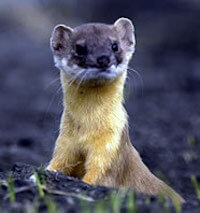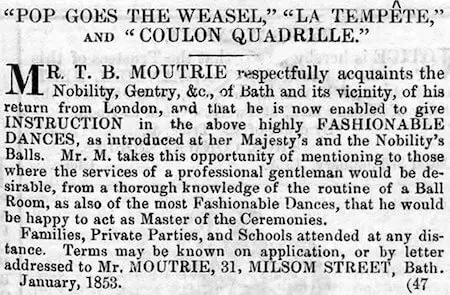Baby Joy Joy Pop Goes the Weasel Halloween
Popular goes the weasel
What's the meaning of the phrase 'Pop goes the weasel'?
The name of the nursery rhyme and song.
What'due south the origin of the phrase 'Pop goes the weasel'?
 Like most nursery rhymes, this has some very odd imagery, which has led to much debate as to the meaning and origin of this rhyme.
Like most nursery rhymes, this has some very odd imagery, which has led to much debate as to the meaning and origin of this rhyme.
The origin is perhaps the easier of the two. The earliest known published version is as the title of a trip the light fantastic melody. "Pop goes the weasel" is a unproblematic melody and there are several English/Irish/Scottish state dances that are like.
 The dance became something of a craze in the 1850s and it was popular enough in early on 1853 for a Mr. Moutrie, in the stylish location of Bath, to have considered it worthwhile to place an advertising in the Bath Relate, offer "instruction the the highly fashionable dances" of 'Popular Goes The Weasel', 'La Tempete' and 'Coulson Quadrille'.
The dance became something of a craze in the 1850s and it was popular enough in early on 1853 for a Mr. Moutrie, in the stylish location of Bath, to have considered it worthwhile to place an advertising in the Bath Relate, offer "instruction the the highly fashionable dances" of 'Popular Goes The Weasel', 'La Tempete' and 'Coulson Quadrille'.
A newspaper advertising by Boosey and Sons in 1854 suggests that Queen Victoria was influential in the popularity of the trip the light fantastic toe:
"The new country dance 'Pop goes the weasel', introduced by her Majesty Queen Victoria."
The dance didn't take lyrics as such. It was a jig and "popular goes the weasel" was shouted out at pregnant points to accentuate the trip the light fantastic.
There'due south no real evidence to advise that 'Popular goes the weasel' was anything other than the nonsense proper noun of a dance or that the meaning of 'pop' and 'weasel' merit whatsoever further investigation.
People do like to speculate though so here's the nearly usually repeated 'caption' of the significant of the phrase, that is, that it derives from the meaning of the well-known plant nursery rhyme.
Rhymes of this sort are repeated word of oral cavity and it's entirely plausible that it existed in oral course equally a children's rhyme before 1850. This 'Chinese whispers' repetition is also the reason for the many variations on the rhyme. Whatever version is picked as the original, it isn't easy to decide the meaning of the words. The version most usually used in England goes similar this:
Half a pound of tuppenny rice,
Half a pound of treacle.
That'due south the way the money goes,
Pop goes the weasel.Up and down the City road,
In and out the Hawkeye,
That's the way the coin goes,
Popular goes the weasel.Every night when I go out
the monkey's on the table.
Take a stick and knock it off
Pop goes the weasel.A penny for a ball of thread
Another for a needle,
That'southward the way the money goes,
popular goes the weasel.All around the cobblers demote
the monkey chased the people;
The donkey idea 'twas all in fun,
pop goes the weasel.
Some of the US versions of the rhyme are significantly dissimilar and may accept an entirely dissimilar source, but using the aforementioned tune. It could be that 'money', 'monkey' and 'ass' that appear in many of the versions are mishearings of the same word. The important words are obviously 'pop' and 'weasel'.
The phrase soon gained concord, in the Us especially, although it didn't have a specific or fixed significant; it appears to have been used only to indicate a sense of occasion - something like 'but like that'. At that place'due south an example of that in a newspaper advertisement for groceries from The Hudson North Star newspaper, April 1856 (including 2000 lbs of Extra Family Butter, whatever that is):
"All Selling Cheap. To Shut Out Inside Sixty Days Or Popular Goes The Weasel"
Of the different meanings of the word weasel, the nigh usually used today is as the name of the small carnivorous mammal. Weasels exercise pop their heads up when disturbed and it is quite plausible that this was the source of the proper noun of the trip the light fantastic.
'Popping' is a slang term for pawning, that is, depositing articles with a pawnbroker in render for money. Weasel may be a corruption of whistle - in cockney rhyming slang 'whistle and flute', that is, suit. It could besides exist from another example of CRS - 'weasel and stoat', meaning coat.
 The Eagle was a London pub, most the Metropolis Route, and a afterward Eagle pub even so exists on the site. The lyrics of the rhyme become:
The Eagle was a London pub, most the Metropolis Route, and a afterward Eagle pub even so exists on the site. The lyrics of the rhyme become:
Upwardly and down the City Route,
in and out of The Eagle,
that's the style the money goes,
pop goes the weasel
This is said to describe spending all your money on drink in the pub and afterward pawning your arrange to heighten some more.
The pawning and popping explanation seem to fit the pregnant of the song and the residue of the lyrics (of the English version at least), so many people similar to believe it is the origin. However, the expression 'pop goes the weasel' has existed since at least the 1850s merely the rhyming slang 'whistle and flute' and 'weasel and stoat' aren't known until the 1930s.
'Pop goes the weasel' merely makes sense as 'pawning the adjust' if 'weasel' was formed from 'weasel and stoat' or 'whistle and flute', which the evidence of the dates calls into question. So, the theory that 'popular' means 'pawn' is unconvincing.
Just for abyss, there's too a theory that the weasel refers to a weaver's shuttle, which makes a popping sound when the loom is in use. Again, this is mere speculation and there's no supporting prove for it.
Rhyming slang began in the 1840s and the primeval of these were unproblematic rhymes of unmarried words, for example, the earliest recorded is 'joano' for 'piano' which dates from 1846.
Information technology is possible that ane of the rhyming slang expressions 'weasel and stoat' or 'whistle and flute' existed prior to 1850 but this seems unlikely.
It's not what people want to hear but 'pop goes the weasel' is nearly likely to be a mere nonsense phrase, like 'the cat'due south pyjamas', and has no especial meaning.
Source: https://www.phrases.org.uk/meanings/pop-goes-the-weasel.html